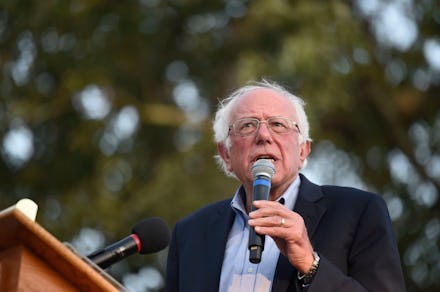Bernie Sanders' new tax plan takes an aggressive shot at billionaires

While most of the Democratic presidential candidates spar over their records and policies, Sens. Bernie Sanders and Elizabeth Warren have maintained a mutual respect. But now, they’re engaged in a different kind of competition — over who can levy higher taxes on the rich. Sanders on Tuesday leapfrogged ahead of Warren when he released his wealth tax proposal, which outlines an extensive array of duties aimed squarely at the wallets of the 1%.
Earlier this year, Warren released an ambitious plan promising to tax people two cents on every dollar they earn over $50 million. But Sanders’ wealth tax would kick into gear at a lower bracket than Warren’s, and scale up further and faster. He’d tax one cent on every dollar earned over $32 million, and then match Warren’s 2% tax at $50 million. From there, his progressive structure would kick up to a 3% tax between $250 and $500 million, 4% from $500 million to $1 billion, 5% from $1 to $2.5 billion, 6% from $2.5 to $5 billion, 7% from $5 to $10 billion, and, finally, 8% over $10 billion.
Warren’s plan only includes one bracket increase: moving up to 3% over $1 billion.
“This country is moving into an oligarchic form of a society,” Sanders said in a speech in Clinton, Iowa, on Monday night, according to Vice. “Although I suspect there are not too many billionaires in this room, what we are saying to the billionaire class is, ‘Stop the greed. Stop the corruption. Stop stepping on everyone in order to make more billionaires.’”
In an interview with The New York Times on Tuesday morning, Sanders expanded on his strategy for reducing extreme wealth inequality in America.
“Let me be very clear: As president of the United States, I will reduce the outrageous and grotesque and immoral level of income and wealth inequality,” he said. “What we are trying to do is demand and implement a policy which significantly reduces income and wealth inequality in America by telling the wealthiest families in this country they cannot have so much wealth.”
“I don’t think that billionaires should exist,” he added. “This proposal does not eliminate billionaires, but it eliminates a lot of the wealth that billionaires have, and I think that’s exactly what we should be doing.”
This latest proposal comes as some of Sanders’ staffers have begun to draw sharper contrasts with Warren, even as Sanders himself has largely avoided any criticism of her, according to Vox. In a recent tweet, Sanders’ national spokeswoman Briahna Joy Gray criticized Warren for not supporting a national rent control plan, while other top surrogates have retweeted criticisms of Warren. The candidates remain neck-and-neck for second place in national polls, and both have topped polls in some of the most important early voting states.
Both Sanders and Warren have staked their campaigns on enormous social programs, including Medicare-for-All and free college tuition, which would likely require trillions of dollars to accomplish. These wealth taxes are the most clear-cut way forward for each of them to finance their big ideas and combat inequality.
Per The New York Times, two prominent economics professors at the University of California at Berkeley released a letter arguing in favor of the Vermont senator’s plan.
“Sen. Sanders' very progressive wealth tax on the top 0.1 percent wealthiest Americans is a crucial step," wrote Emmanuel Saez and Gabriel Zucman. "We estimate that Sanders’ wealth tax would raise $4.35 trillion over a decade and fully eliminate the gap between wealth growth for billionaires and wealth growth for the middle class.” Warren's plan, by contrast, would raise only $2.6 trillion per their estimate.